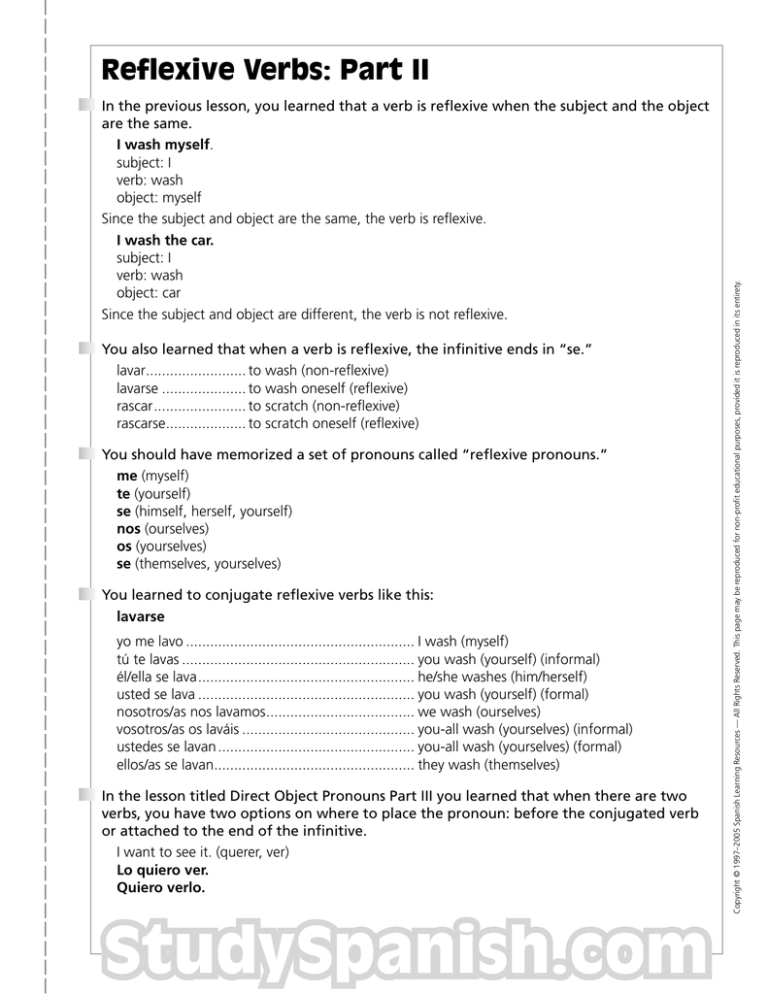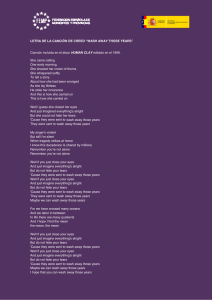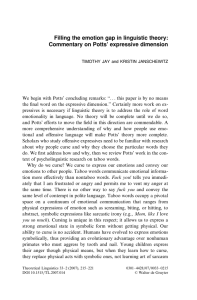Reflexive Verbs: Part II
Anuncio

In the previous lesson, you learned that a verb is reflexive when the subject and the object are the same. I wash myself. subject: I verb: wash object: myself Since the subject and object are the same, the verb is reflexive. I wash the car. subject: I verb: wash object: car Since the subject and object are different, the verb is not reflexive. You also learned that when a verb is reflexive, the infinitive ends in “se.” lavar......................... to wash (non-reflexive) lavarse ..................... to wash oneself (reflexive) rascar ....................... to scratch (non-reflexive) rascarse.................... to scratch oneself (reflexive) You should have memorized a set of pronouns called “reflexive pronouns.” me (myself) te (yourself) se (himself, herself, yourself) nos (ourselves) os (yourselves) se (themselves, yourselves) You learned to conjugate reflexive verbs like this: lavarse yo me lavo ......................................................... I wash (myself) tú te lavas .......................................................... you wash (yourself) (informal) él/ella se lava ...................................................... he/she washes (him/herself) usted se lava ...................................................... you wash (yourself) (formal) nosotros/as nos lavamos ..................................... we wash (ourselves) vosotros/as os laváis ........................................... you-all wash (yourselves) (informal) ustedes se lavan ................................................. you-all wash (yourselves) (formal) ellos/as se lavan.................................................. they wash (themselves) In the lesson titled Direct Object Pronouns Part III you learned that when there are two verbs, you have two options on where to place the pronoun: before the conjugated verb or attached to the end of the infinitive. I want to see it. (querer, ver) Lo quiero ver. Quiero verlo. StudySpanish.com Copyright © 1997–2005 Spanish Learning Resources — All Rights Reserved. This page may be reproduced for non-profit educational purposes, provided it is reproduced in its entirety. Reflexive Verbs: Part II Lo debemos comprar. Debemos comprarlo. We should buy it. María nos debe visitar. María debe visitarnos. Mary should visit us. The same is true regarding reflexive pronouns. When the sentence has two verbs, the pronoun can be placed directly before the conjugated verb or attached to the end of the infinitive. I want to see myself. Me quiero ver. Quiero verme. John needs to wash his hair. Juan se necesita lavar el pelo. Juan necesita lavarse el pelo. Maria can wash her face now. Ahora María se puede lavar la cara. Ahora María puede lavarse la cara. I have just gone to bed. Acabo de acostarme. Me acabo de acostar. We prefer to wash with scented soap. Preferimos lavarnos con jabón perfumado. Nos preferimos lavar con jabón perfumado. Whenever a verb directly follows a preposition, it remains in the infinitive form. For reflexive verbs, the ending -se changes to agree with the subject. Observe the differences in the following sentences, all of which are about counting burros before falling asleep. Antes de dormirme, yo cuento burros. Antes de dormirte, tú cuentas burros. Antes de dormirse, la chica cuenta burros. Antes de dormirnos, nosotros contamos burros. Antes de dormiros, vosotros contáis burros. Antes de dormirse, los chicos cuentan burros. In English, many verbs can be used transitively (with a direct object) or intransitively (without a direct object). The sun dried the clothes. (transitive) The clothes dried in the sun. (intransitive) StudySpanish.com Copyright © 1997–2005 Spanish Learning Resources — All Rights Reserved. This page may be reproduced for non-profit educational purposes, provided it is reproduced in its entirety. Juan lo necesita lavar. Juan necesita lavarlo. John needs to wash it. In Spanish, these intransitive constructions frequently employ the reflexive form. The sun dried the clothes. (transitive) ................. El sol secó la ropa. The clothes dried in the sun. (intransitive) ........... La ropa se secó al sol. Sometimes, the reflexive construction is used merely to emphasize who is performing the action of the sentence. The cake? Maria ate it ....................................... ¿La torta? María se la comió. For some verbs, the meaning changes when they are used reflexively. aburrir - to bore aburrirse - to be bored acordar - to agree acordarse de - to remember acostar - to put to bed acostarse - to go to bed casar - to perform a marriage ceremony casarse con - to become married to someone despedir - to fire despedirse de - to say goodbye dormir - to sleep dormirse - to fall asleep ir - to go irse - to go away, to leave morir - to die (abruptly, as of an accident, war, etc.) morirse - to die (as from natural causes; also “to die” figuratively) negar - to deny negarse a - to refuse parecer - to seem parecerse a - to resemble poner - to put ponerse - to put on probar - to try, to taste probarse - to try on quitar - to take away quitarse - to take off StudySpanish.com A few verbs are always used reflexively. arrepentirse (e:ie) ..... to repent atreverse a ............... to dare darse cuenta de ....... to realize jactarse de ............... to boast quejarse de .............. to complain about suicidarse ................. to commit suicide StudySpanish.com


